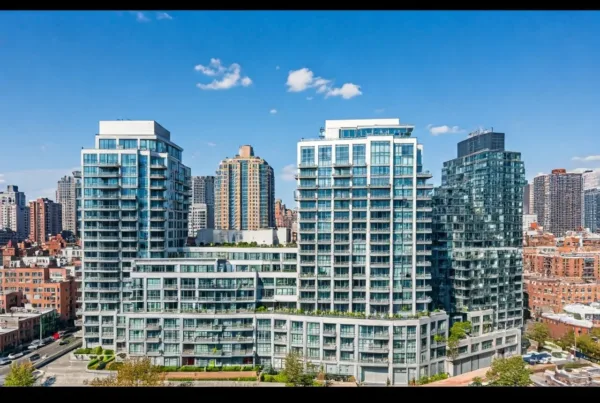Uncover the mystery behind sponsor units in NYC real estate – the hidden gems or potential pitfalls awaiting savvy buyers.
Table of Contents
Introduction: What is a Sponsor Unit?
In New York City, the world of real estate can be confusing, especially with terms that people often use. One important term you might hear is “sponsor unit.” So, what does sponsor unit mean? Let’s break it down in a simple way.
Basic Definition
A sponsor unit is a type of apartment that is owned by a developer or a company, not an individual person. When a building is first built, the developer might keep some of the units for themselves or their company. These are what we call sponsor units. For example, imagine a big new building with shiny, fresh apartments. If the builder has a few of those apartments left after selling the others, those apartments are considered sponsor units.
Why It Matters
Understanding what a sponsor unit is can help you when you are looking to buy an apartment in NYC. Sponsor units can be important because they often come with different rules than other apartments. For example, if you want to buy a regular apartment in a co-op building, you may have to go through a process to get approval from the board. But with a sponsor unit, that approval is usually not needed, which can make buying the apartment a lot simpler. So when you’re searching for your new home, knowing what is a sponsor unit can help you find good options faster!
Identifying Sponsor Units
When you are on the hunt for a sponsor unit, there are specific features that can help you identify them. First, these units often come straight from the real estate sponsor, which means they are usually not owned by individual homeowners. This makes the buying process a bit different. One clear sign is that sponsor units are typically available immediately, without waiting for a board to approve the sale.
Another characteristic to notice is that these units often come without certain restrictions. For example, you might find fewer rules about renting the unit out later on. Plus, these sponsor apartments might also not require lengthy applications or interviews, unlike other types of apartments. Since they are part of a bigger development, they usually are more standardized in design but can still offer appealing layouts and finishes.
Where to Find Them
Now, if you’re wondering where to find sponsor units, look no further than some popular types of buildings in NYC. These units are often located in large apartment complexes or condominiums rather than smaller buildings. High-rise buildings or new developments are great places to start. The real estate sponsor usually has several units available at once, making them easier to spot in these areas.
Also, check listings online that specifically mention what is a sponsor unit. They tend to be featured prominently. You might want to pay attention to new construction projects, as these developments often offer many units straight from the sponsor. Keep an eye out for ads and signs indicating “sponsor units available” – that’s your way in!
How Do Sponsor Units Work?
To understand how sponsor units work, we need to look at two important ideas: the sponsor unit meaning and the role of a real estate sponsor. Let’s break it down.
Role of a Real Estate Sponsor
A real estate sponsor is a person or a company that owns and manages a building or a group of apartments. When we talk about a sponsor unit, we are referring to the apartments that these sponsors offer directly to buyers. This means that instead of going through a complicated process and needing permission from a board of other owners, you can buy the unit straight from the sponsor.
Real estate sponsors take care of many things. They handle repairs, manage the property, and make decisions about how the building runs. They also make sure everything follows city rules. This makes buying a sponsor unit easier because the owners don’t have to worry as much about the other owners in the building.
Buying a Sponsor Unit
When you decide to buy a sponsor unit, the process is usually simpler than buying a regular apartment. This is because you won’t need to ask a group of people to approve your purchase—something called board approval. Instead, you can work directly with the sponsor to agree on a price and the paperwork needed to seal the deal.
Here’s how buying a sponsor unit typically works:
- Finding the Unit: First, you look for sponsor units in listings, where a sponsor usually advertises their available apartments.
- Contacting the Sponsor: Once you find a unit you like, you reach out to the sponsor for more information.
- Making an Offer: If you want to buy the unit, you will make an offer to the sponsor directly.
- Paperwork: After agreeing on a price, you will fill out some paperwork. This part is important because it ensures everything is legal.
- Closing the Deal: Finally, you will complete the sale, which is often called the closing process, and then you’ll officially own your new unit!
Buying a sponsor unit can be a great choice. It allows you to skip some usual steps like waiting for board approval, which can take a long time! Plus, because sponsors often want to sell units quickly, they may offer better prices on their apartments compared to others.
Pros and Cons of Sponsor Units
Buying a sponsor unit comes with several advantages that can make it an appealing option for many people. One of the biggest benefits is that there is no board approval needed. This means that when you decide to buy a sponsor unit, you won’t have to wait for a group of people to say yes to your offer. You can move through the buying process faster. This is great for those who want to live in NYC quickly!
| Sponsor Unit | Definition | Details |
|---|---|---|
| What is a sponsor unit? | Sponsor units refer to apartments in a building that are still owned by the original developer or sponsor and are typically sold directly by the sponsor. | – Not subject to rent stabilization regulations – Often in new developments – Sold at market rate |
| Regulations | Sponsor units are not subject to the same regulations as rent-stabilized apartments, giving sponsors more flexibility in pricing and renting. | – No rent control restrictions – Can be sold at any price – No need for regulatory approval |
| Buying a sponsor unit | Buying a sponsor unit can offer advantages such as getting a brand new apartment at market prices and potentially more negotiating power with the sponsor. | – More flexibility in negotiations – Opportunity to customize finishes – Possibility of incentives from sponsors |
Another reason people like sponsor apartments is that they are often less expensive than other types of apartments. Sometimes, prices for sponsor units can be lower because they are sold directly by the sponsor. This can be a golden opportunity for first-time buyers or anyone looking for a good deal in a busy city like New York.
Additionally, sponsor units are usually in great locations. Many are found in buildings that are well-kept and in popular neighborhoods. This means you can enjoy living close to shops, parks, and schools!
Disadvantages
While there are many advantages, buying a sponsor unit also has some downsides. One potential downside is the condition of the unit. Sometimes, these units might need some fixing up or renovating. If you are not ready for some hard work or extra costs to make the unit like new, it could be a problem.
Another consideration is that you might not have as much control over the renovations. Many sponsor apartments come “as is,” which means that the sponsor might not make any changes before you buy. This could lead to extra expenses for things you want to fix or change later on.
Lastly, it’s important to remember that since you are buying directly from a sponsor, you might miss out on the community feel that comes with co-op apartments where buyers meet with the board and neighbors. This could make you feel a little less connected to your new home.
Conclusion and Summary
In this article, we learned a lot about what a sponsor unit is and why it matters in the New York City real estate market. A sponsor unit is a type of apartment that is sold directly by a real estate sponsor instead of a personal owner. This means the buying process can be different, and sometimes easier. Understanding the sponsor unit meaning helps buyers know what to expect.
We discovered that sponsor units come with unique features. They often don’t require board approval, which can make buying one simpler. However, sponsor apartments may sometimes need repairs or renovations, which is a factor to keep in mind. The key is to weigh the pros and cons when considering a sponsor unit. This will help you make a smart choice based on your needs and budget.
Overall, knowing about sponsor units and what is a real estate sponsor helps you feel more confident when searching for a new home. Understanding these concepts can help you make a better decision and find the right place for you. Now, you are better prepared to explore the exciting world of NYC real estate!
Frequently Asked Questions (FAQs)
In this section, we will answer some common questions about sponsor units and real estate sponsors. These questions help us understand what these terms mean and how they work in the world of New York City real estate.
Are sponsor units cheaper?
Many people wonder if sponsor units are cheaper than other types of apartments. Generally, sponsor units can be less expensive. This is because when you buy a sponsor apartment, you often avoid costs like extra fees or complicated approval processes that come with other types of apartments. However, the price can vary based on the condition of the unit and the location.
Do sponsor units require board approval?
No, sponsor units typically do not require board approval. When you buy a sponsor unit, you are buying directly from the real estate sponsor. This means the process can be much quicker and simpler than buying from an individual owner. Since you are not tied to a board decision, it can make things easier for buyers.
Can I renovate a sponsor unit?
Begin your search and start earning cash back!
You can usually renovate a sponsor unit, but there are some rules you should follow. It’s essential to check any guidelines from the real estate sponsor before you start. Some sponsors might have specific rules about what you can change in the apartment. Always make sure to get the right approvals and permits to avoid any problems later on.







